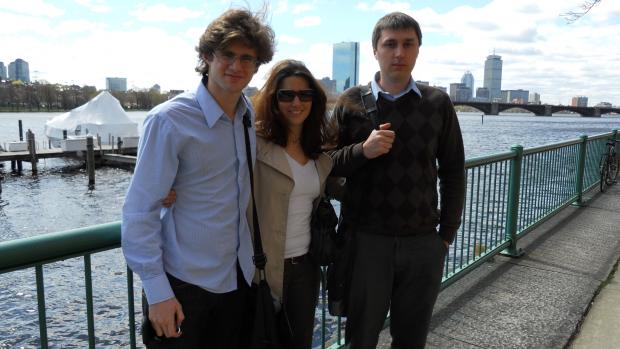Defeat Pushes PolySolar Forward, Not Backward

PolySolar made it as far as the final round of the NYU Stern School of Business 6th Annual Social Venture Competition, part of the school’s 11th Annual Business Plan Competition — which offers $175,000 in prizes — before losing out at the end of April, but the defeat only sharpened participants’ interest in what had initially been an academic exercise.
“The whole time we were just trying to get into the next stage and see if we could make it through the competition,” explains Alexis Shellhammer, a first-year graduate student at NYU Stern. He and three NYU-Poly students compose PolySolar, a start-up centered on a new technology that promises the production and sale of solar cells at dramatically reduced costs.
“We’re trying to decrease the price of solar cells by 95 percent,” says Eduard Nasybulin, a PhD candidate in NYU-Poly’s Department of Chemistry. He and Ian de Albuquerque, who is pursuing a combined bachelor’s and master’s degree in chemical engineering, are the researchers behind the technology and the duo that approached Kalle Levon, NYU-Poly professor of chemical and biological science, about their idea. (The two tied for first place in NYU-Poly’s Inno/Vention student idea competition in March with their solar cell technology.) With Professor Levon’s blessing, Nasybulin and de Albuquerque attended an information session about the Stern competition. There Shellhammer and Adi Kalderon, who received a master’s degree in technology management from NYU-Poly this spring and also participated in Inno/Vention, approached Nasybulin and de Albuquerque, and PolySolar was born.
The quartet didn’t know each other before the session but has since formed collaborative relationships. “You have to work as a group,” says Kalderon. “Teamwork is number one.”
But such alliances can be hard to come by, says Shellhammer. In a culture where the phenomenal rise and theatrical descent of start-ups is closely tracked, “scientists feel like they’re being preyed upon,” Shellhammer says, “but they feel they have all the power because they can create the product. Why do they need someone who is going to come in and take all their money? There’s a trust issue.”
Some scientists might be leery of partners with a business background and instead opt to commercialize products on their own, but Nasybulin is skeptical of that approach. “You do one thing or the other. You cannot do two things at the same time,” he says. “If you disperse yourself, you cannot concentrate and you cannot do something great.”
Nasybulin aims high, as do many entrepreneurs who found their own companies, but only 40 percent of start-ups reap profits. According to the National Federation of Independent Business’ Education Foundation, the remaining 60 percent either break even or lose money. With odds like those, deciding to take a risk on your own company can be daunting.
“To enter and start a new science company takes a lot of capital, and as a student, it’s scary,” says Shellhammer. “You’d rather work for a company that’s big and stable, get your paycheck, and still be able to apply your knowledge.”
The relative youth of a student can also produce the opposite result, interjects Kalderon. “You’re a student: you’re young. You don’t have any commitments,” she says. “When you get older, you think, ‘I have a mortgage. I have children.’”
For now, none of the students in PolySolar have either mortgages or children, and they’re exploring ways to turn what was once an entry in a student competition into a solid business venture. They plan to apply for grants and are considering working with another Brooklyn-based start-up as both companies move towards the pilot stage of the solar energy devices they hope to commercialize — all this from a chance meeting at a routine presentation. “These kinds of competitions force students to begin collaborating. That’s good,” says Kalderon, who had other ideas about her future before she joined PolySolar, which now plays a much larger role in her plans.
“It’s like that John Lennon song: ‘Life is what happens to you / While you’re busy making other plans,’” she smiles. “It’s fun. It’s interesting.”




